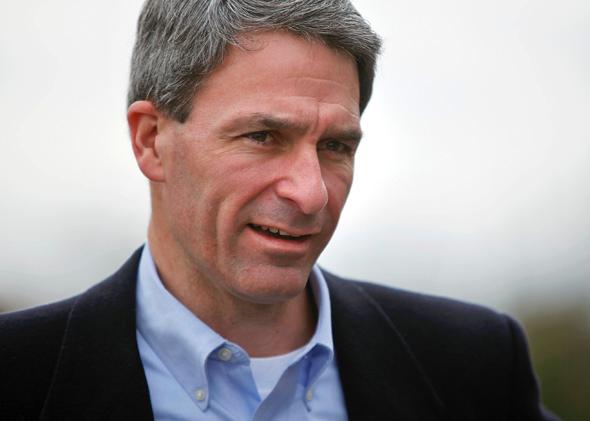The argument among Republicans over why they lost the governor’s race in Virginia feels like the debate over “who lost China” in the 1950s. Did Republican candidate Ken Cuccinelli lose because he was too conservative? Or, did he lose because the Republican establishment didn’t support him? This isn’t just a matter of scapegoating. Every losing campaign has its fights and finger pointing (and the authors of Double Down would like to thank you for that), but sometimes it just stops there. There was no greater meaning to take away from the postgame tussle after Hillary Clinton’s primary loss in 2008. This blame game is important, however, because it is really a fight about the Republican Party’s strategy for the future.
In the first round, the existing participants in the Republican internal party debate have pretty much played to type. Karl Rove, who is pushing the party to nominate “electable” candidates, writes that Cuccinelli’s loss shows that GOP candidates need to unite the party’s factions instead of alienate them. The New York Times suggests Cuccinelli’s loss has reanimated the push to end the highly partisan nominating conventions that lead to people like the former Virginia attorney general being picked in the first place. Exit polls show that 50 percent of Virginia voters found Cuccinelli too extreme. Activist conservatives, on the other hand, blame the Republican Governors Association and the Republican National Committee for not putting enough money into the race. The Tea Party crowd claims the establishment sold the Tea Party out again, just as it did during the government shutdown when moderate GOP senators didn’t have the guts to stand and fight over Obamacare.
Same whine, new bottles, right? No. There is one important contributing factor to the loss that both sides agree on. Rove argued in his Virginia election post-mortem that the government shutdown contributed to Cuccinelli’s defeat. Cuccinelli campaign strategist Chris LaCivita agrees: The government shutdown distracted from talking about the failure of Obamacare’s launch. “There was definitely a national mood that was moving, that is moving, that is continuing to move against the White House and the Affordable Care Act. And I can’t help but ask myself, what would have been the result had he had five weeks of this discussion instead of just two and a half?”
LaCivita would like to have October back, and spend the whole month beating Obamacare like a drum. Instead, more than half of the month was spent on the shutdown and the parlor game of whether the Republican Party would drive the country over the debt limit brink. The Cuccinelli camp can’t know for sure whether this strategy would have changed the election’s outcome. They didn’t do a poll in the last few weeks of the race and have no data to support their view. But the numbers don’t matter among Republicans who believe highlighting Obamacare’s failures is a campaign winner—the only question left to settle is the tactical wisdom or stupidity of the government shutdown.
The debate over Obamacare and the shutdown was about tactics, where those who were not willing to do absolutely everything were seen as less committed to the cause. In this effort, Cuccinelli and his Republican brethren were on the same side. Cuccinelli and Sens. Mike Lee and Ted Cruz, two of the main authors of the effort to defund Obamacare, are fellow travelers. They believe that the health care law is so bad that all necessary measures should be taken to undermine it. Cuccinelli regularly boasted on the stump that he had been the first attorney general to lodge a suit against the Affordable Care Act. He had done everything in his power to undo the law. As senators, Cruz and Lee did their part too—pushing for a government shutdown, despite what the polls and many of their fellow Republicans told them.
Such a forward-leaning, conservative stance was not just the right thing to do, argue its adherents, it was also the politically smart thing to do. It shows your most ardent supporters that you really mean what you say. Do controversial things in support of what you believe, and voters will flock to you. The opposite argument, offered by members of the “establishment,” is that sometimes while everyone might agree on the goal, different tactics are required to get there, even if it means getting there in the long run. Many of these more pragmatic voices were in the Senate cloakroom, arguing that a government shutdown would hurt the Republican brand and distract from the better sport of watching Obamacare collapse under its own weight.
That strikes the rising right as timid and weak. In the aftermath of the shutdown, when the GOP’s approval rating crashed, Tea Party supporters argued that while they may not have achieved their ultimate goal of stopping Obamacare, they highlighted the deficiencies in the program. They believed their antics had thrilled the public and those same voters would reward them for their principled stand. The Washington insiders might not have liked it, but the voters did.
But after Cuccinelli’s closer-than-expected election loss, that’s not how his camp sees it anymore. By blaming its woes on the shutdown distraction, the Cuccinelli campaign sounds an awful lot like establishment Republicans before the shutdown. Now, in the clear light of defeat, this band of conservatives seems to appreciate that sometimes there are costs to doomed acts of principle. To wonder about those costs in advance of the kamikaze strategy is not a sign that you are weak, unprincipled, or a RINO—it simply keeps you from having to blame the strategy when the election is over and it’s too late.
